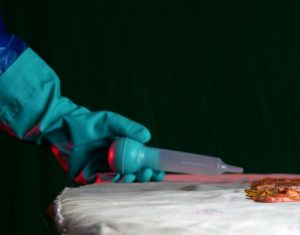
The following is a brief description of the short research project “Staying in touch: post-coronavirus art curating” developed on behalf of Cultivamos Cultura in the framework of Biofriction by the working group Art Shows and Public Health leaded by Dalila Honorato and composed by Robertina Šebjanič, Louise Mackenzie, Karolina Żyniewicz and Isabel Burr Raty (short bios included below).
Theme
Staying in touch: post-coronavirus art curating
Description
Imagine an art space that functions like a biosafety lab at level 4, where visitors wear positive-pressure suits, carefully walking from art show cabinet to disinfected art show cabinet while passing through a chemical shower for decontamination. Imagine an art space where you have to sign a term of responsibility for any personal injuries caused by a possible leak on your suit or any error in the airflow control system. This might be the future for the operation of art spaces in this new era of contagious, where art spaces are challenged with the creation of innovative strategies for ensuring public health to guarantee the continuing of their activities. After all, there might be other solutions other than transferring an entire art show to a digital platform and lockdown.
While the financial support to cultural institutions is immediately necessary for the recent COVID-19 crisis, nothing guarantees that the deactivation of this coronavirus is the end of similar viral emergencies. Maybe this is the beginning of the post-anthropocene era when human lives will be passed between periods of isolation and integration in the natural and social environments. How can art spaces be prepared to respond to this possible pendulum of cyclical outbreaks?
The objective of this workgroup is the development of different scenarios for ensuring access to art as an essential need for the cultural identity of a society and its individuals. The workgroup aims to propose a variety of provisions that can guarantee the required level of biosafety and security engineering further than physical distancing and adequate methods of decontamination in art spaces. The research is based on historical data of previous pandemics and information on technology and protocols of biocontainment used in high-security labs, space and underwater research as well as in science fiction storytelling.
Workgroup title
Art Shows and Public Health
Members of the workgroup
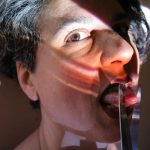
Dalila Honorato, Ph.D, is Tenured Assistant Professor in Aesthetics and Visual Semiotics, Ionian University, Greece, and collaborator at the Center of Philosophy of Sciences, Univ. Lisbon, Portugal. Cofounder of the Interactive Arts Lab, she is the head of the interdisciplinary conference “Taboo-Transgression-Transcendence in Art & Science”, and, together with Marta de Menezes, the conceptualizer and developer of the project “FEMeeting: Women in Art, Science and Technology”. She is a full member of the Board of Directors of the “Municipal Gallery of Corfu” (2020-2023). She was a guest speaker at: festival Extravagant Bodies: Extravagant Love (Croatia); ASFA Lectures Series, Athens School of Fine Arts (Greece); a.pass Research Center (Belgium); CIAC, Univ. Algarve (Portugal); Coalesce Center for Biological Art, Univ. Buffalo (USA); BioDesign Seminar Series, Parsons (USA); symposium Arts Based Research in Times of Climate and Social Change, CNSI – UCLA (USA); Penny Stamps, University of Michigan (USA), etc.
Website: https://inarts.eu/en/lab/staff/honorato/
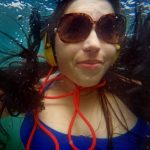 Robertina Šebjanič, based in Ljubljana, is an internationally exhibited and awarded artist. Her art-research focus is since several years into cultural, (bio)political, chemical and biological realities of aquatic environments, which serves as a starting point to investigate and tackle the philosophical questions on the intersection of art, technology and science. Her ideas and concepts are often realized in collaboration with others, through interdisciplinary and informal integration in her work. She was awarded with Honorary Mention at Prix Ars Electronica 2016, STARTS2016 nomination and nomination for the White Aphroid award. Robertina was SHAPE platform 2017 artist. She been resident artist / researcher: 2018 at Ars Electronica (EMARE / EMAP), 2019 at RV Celtic Explorer in frame of the Aerial/Sparks project, Galway 2020. Her art work Aurelia 1+Hz / proto viva generator (artist proof) is since 2019 part of the BEEP Electronic Art Collection, Spain.
Robertina Šebjanič, based in Ljubljana, is an internationally exhibited and awarded artist. Her art-research focus is since several years into cultural, (bio)political, chemical and biological realities of aquatic environments, which serves as a starting point to investigate and tackle the philosophical questions on the intersection of art, technology and science. Her ideas and concepts are often realized in collaboration with others, through interdisciplinary and informal integration in her work. She was awarded with Honorary Mention at Prix Ars Electronica 2016, STARTS2016 nomination and nomination for the White Aphroid award. Robertina was SHAPE platform 2017 artist. She been resident artist / researcher: 2018 at Ars Electronica (EMARE / EMAP), 2019 at RV Celtic Explorer in frame of the Aerial/Sparks project, Galway 2020. Her art work Aurelia 1+Hz / proto viva generator (artist proof) is since 2019 part of the BEEP Electronic Art Collection, Spain.
Website: https://robertina.net/
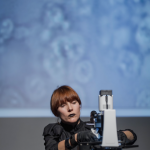
Karolina Żyniewicz is an artist (2009 graduated from the Academy of Fine Arts in Łódź, Department of Visual Arts) and researcher, PhD student (Nature-Culture Transdisciplinary PhD Program at Artes Liberales Faculty, University of Warsaw). Working in a laboratory (mostly at the Institute of Genetics and Biotechnology, Faculty of Biology, University of Warsaw) locates her works in the field of bio art, although she tries to avoid using this term. She sees her liminal activity as situated knowledge production. She is mostly focused on life in its broad understanding (its biological and cultural meaning). Her projects have mostly conceptual, critical character. The main point of her PhD research interest are multilevel relations emerging during realization of liminal projects. She tries to put her observations, as an artist/researcher (liminal being), in the context of Science and Technology Studies (STS) Actor-Network Theory by Bruno Latour and feminist humanities.
Website: http://karolinazyniewicz.com/
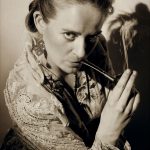 Isabel Burr Raty (BE/CL) is an artist and filmmaker working between Brussels and Amsterdam. She is interested in exploring the interstices between the organic and the artificial, between the unlicensed knowledge of minority groups and the dominant narratives. She teaches Media Art History in École de Recherche Graphique, is researcher in Nadine-WAB V Brussels and jury member in Autonomous Design Master KASK Gent. In 2018-2019 she obtained bio-art/design AFK 3 Package-Deal Grant, which partnered her to Waag and Mediamatic Amsterdam. Her artworks intertwine live art and new media installations inviting audiences to queer fixed categories of production understandings, and experience the benefits of embodying SF in real time, such as the Beauty Kit Female Farm. Her works and collaborations have been shown internationally, ie: Palais de Tokyo Paris, Royal Flemish Theater, ISEA Hong Kong, Eco-Futures London. With the support of Media fund, Isabel is developing her second film, exposing the impact of colonialism on Easter Island’s Rapa Nui people.
Isabel Burr Raty (BE/CL) is an artist and filmmaker working between Brussels and Amsterdam. She is interested in exploring the interstices between the organic and the artificial, between the unlicensed knowledge of minority groups and the dominant narratives. She teaches Media Art History in École de Recherche Graphique, is researcher in Nadine-WAB V Brussels and jury member in Autonomous Design Master KASK Gent. In 2018-2019 she obtained bio-art/design AFK 3 Package-Deal Grant, which partnered her to Waag and Mediamatic Amsterdam. Her artworks intertwine live art and new media installations inviting audiences to queer fixed categories of production understandings, and experience the benefits of embodying SF in real time, such as the Beauty Kit Female Farm. Her works and collaborations have been shown internationally, ie: Palais de Tokyo Paris, Royal Flemish Theater, ISEA Hong Kong, Eco-Futures London. With the support of Media fund, Isabel is developing her second film, exposing the impact of colonialism on Easter Island’s Rapa Nui people.
Website: https://www.isabel-burr-raty.com/
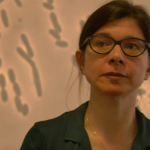
Louise Mackenzie is an artist working across contemporary visual art practice, new media (bio) art, film and sound. Her research explores the more-than-human concept of lively material through process-based and participatory art practice and feminist science studies. She is a member of the Cultural Negotiation of Science research group, Northumbria University, an Associate of the Institute of Genetic Medicine, Newcastle University and holds a PhD in Fine Art from BxNU, a BALTIC CCA and Northumbria University partnership. Louise has spoken at RE:SOUND 2019, Denmark, TransImage2018 Edinburgh, ISEA2017 Colombia, ISEA2016 Hong Kong, Leonardo LASER London and Sonic Environments 2016 Brisbane. Her works have been exhibited at Pomona Museum of Art (USA), Unhallowed Arts (Australia), Charles Darwin House (London), the National Library of Spain (Madrid), Lumiere (Durham), Summerhall (Edinburgh), BALTIC CCA and BALTIC39 (Newcastle), Bond House (London), Basement 6 Collective (Shanghai) and National Taiwan University of the Arts (Taiwan).
Website: http://www.loumackenzie.com/